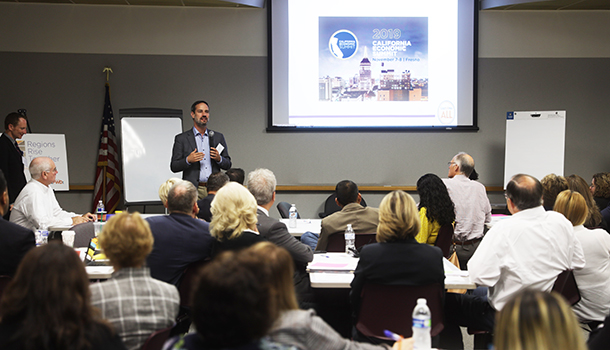
CA Fwd CEO Micah Weinberg speaks at the Regions Rise Together event in Bakersfield (Photo: Victor Abalos/CAFwd)
When the latest Regions Rise Together meeting was held in Bakersfield last week, it attracted leaders from across Kern County and the southern San Joaquin Valley. The event was designed to deepen the dialogue between the state and the region, as we all work towards an economy that works for everyone in all of the state’s regions.
For event sponsor, Andy Stanley of the Bank of America, it was an opportunity to “hear from local leaders of what’s important to them to bring greater prosperity to our communities.”
The local and regional leaders showed up in force having been recruited by local co-hosts the Greater Bakersfield Chamber of Commerce, the Kern Community Foundation, The Kern Economic Development Corporation and the local Council of Governments.
The region's agriculture sector was also well represented. “We truly feed the world,” said Ariana Joven, executive director of the Kern County Farm Bureau. “Water supplies and an aging workforce are two big issues our growers deal with on a daily basis. We want to the state to listen to us on issues of water, trade and labor.” In particular, Joven pointed out the new groundwater regulations that take effect next year will have a major impact on the regional economy and need to be managed very carefully to protect jobs as well as the state’s food supply.
The energy industry is a huge driver in the area as well. It’s the state’s largest oil producing county — 75% of the state’s oil production comes from Kern County — and it’s also the largest producer of renewable energy. “State government needs to include our industry at the table to be part of the solutions, “said Cindy Pollard, director of public affairs at Aera Energy. “The Valley has depended on the mobility and the prosperity that the oil industry provides.”
That theme was echoed by Bakersfield Mayor Karen Goh who said the state needs to understand “we are a unique community and it’s important that well-intended regulations are reexamined for the effect they are having on us.” For the CEO of the Greater Bakersfield Chamber of Commerce, Nick Ortiz, the state officials in the meeting needed to “appreciate our uniqueness and understand that the Central Valley is not all the same.”
The region's education efforts to better prepare young people for the jobs of the 21st century was also a key topic of the day. The Kern Education Pledge has local school officials from pre-school through college working together on the challenges there.
There are 240,000 students in Kern County alone, from kindergarten through college and a staggering 75% of them are low income. How they are prepared for jobs — and especially for jobs in the area — demands new thinking.
“It’s the new marriage with business and education that calls for a different type of education,” said Rob Arias, chief deputy of local and statewide initiatives at the Kern County Superintendent of Schools office. “Kern County represents a lot of what California is and what California can become and education leaders are working better together to create those opportunities for our young people.”
The meeting in Bakersfield attracted around a dozen leaders from state government, including Kate Gordon, Governor Newsom’s director of planning and research and senior advisor on climate change.
“We heard from leaders that the region would like to see more economic diversity because they know being dependent on natural resources is being dependent on things that are very volatile like oil prices, weather and climate change,” said Gordon.
Gordon also emphasized that the state officials are hearing loud and clear that inland California isn’t one place but a series of unique regions that have both common and individual interests. They’ve already met with leaders in the Inland Empire and Stockton, with meetings in Merced and Redding still on the agenda this fall.
All of this work will result in Governor Newsom addressing the 2019 California Economic Summit in Fresno on November 8 to outline his prescription for an economic policy that will lift all areas of the state —notably inland California.
The Regions Rise Together initiative is based on three assumptions.
- The mental map of California must change to include the vast contributions of the inland areas of the state
- A bottoms-up regional approach to problem solving works best in California.
- The state government provides the connective tissue through its funding of education, water, rail and other areas.
“The state is so complicated with so many different economies, it requires a sharp focus to make sure every region in included,” said California Forward CEO Micah Weinberg. “The Governor is committed to outlining a set of proposals and thoughts to make sure every part of California is heard which is why we are doing this work.”

